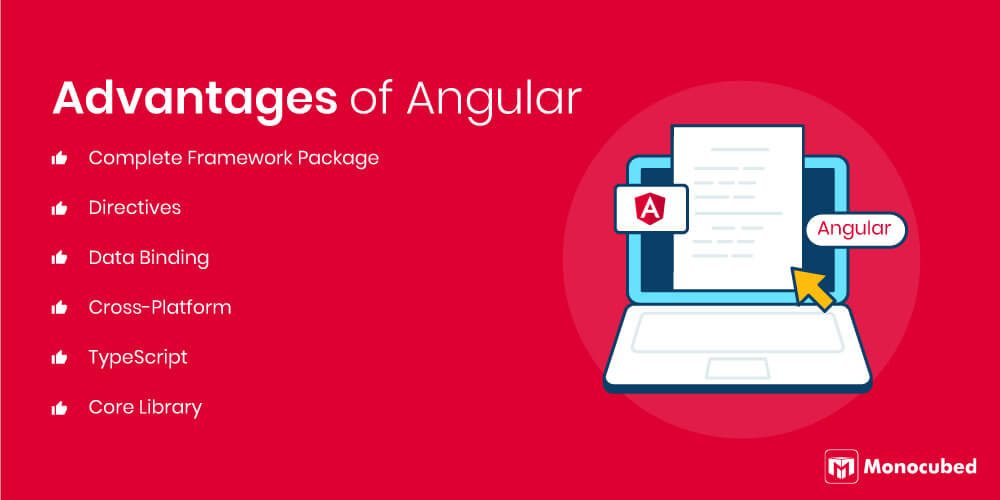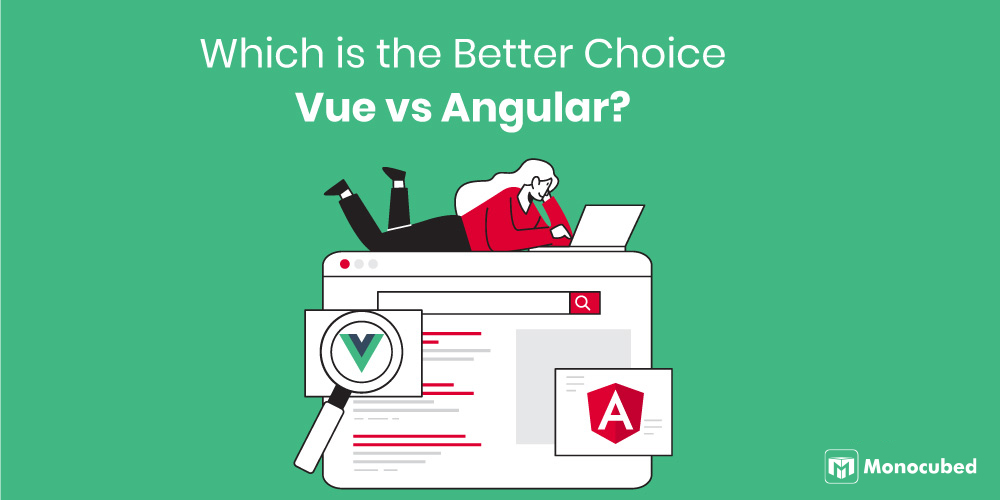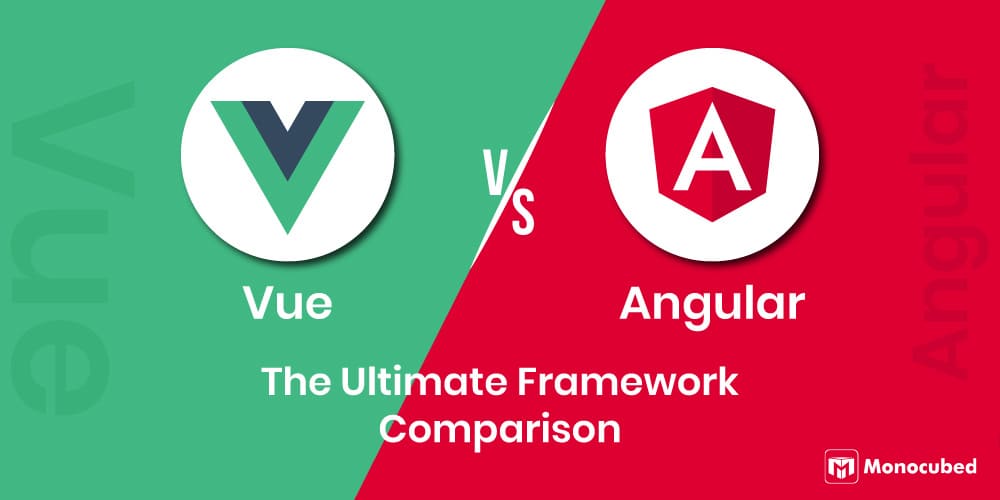Although numerous JavaScript frameworks have been released in the past, nothing has come close to the holy trinity- Angular, React, and Vue. We have already done an in-depth comparison of Vue Vs React, and Angular Vs React.
In this blog, we do a detailed analysis on Vue js Vs Angular to find which one is the better framework for you.
Angular.js and Vue.js are both JavaScript frameworks used for the front-end development of web interfaces. While Angular is a TypeScript structured framework, Vue is a more progressive lightweight framework.
So, let’s make this choice easier for you and have a good old Vue Vs Angular showdown. First, let’s understand the basics of both web frameworks.
Table of Content
What is Angular all About?
Angular is a JavaScript front-end framework, first released in 2010 as AngularJS. Developed by Google, it underwent significant changes in 2016 when the second version was released. Due to a lot of confusion, Angular 2 was later renamed Angular and became a separate entity from AngularJS.
Angular.js is a very famous framework and has a set of very dedicated followers. It has excellent features like MVC framework, HTML templates, and components, such as MongoDB, Node.JS, and Express.JS, that have kept Angular at the top for years.
There is no doubt that Angular is a complete frontend development framework, perfect for developing a web application.
What is Vue js Used For?
Vue.js is a faster, simpler, and sleeker child of the React and Angular JS frameworks. Developed by Evan You in 2014, it has amassed a massive following in a very short time for its lightweight, progressive web development framework.
It is worth noting that Vue doesn’t have the backing of huge companies like Google (Angular) and Facebook (React). It functions entirely through the open-source developing community.
The main reason for Vue’s immense popularity is that it brings together the best of Angular and React. Evan You, who had closely worked on Angular when he was with Google, has figured out a full-proof formula for a successful frontend Javascript framework.
Learning from the ups and downs of Angular and React, Vue ensures to repeat no mistakes. It solely focuses on the View layer, that is, building user interfaces.
Vue Vs Angular – 8 Key Differences To Focus on
Vue is considered to be a child of the Angular and React JavaScript frameworks. So, it is obvious that there would be numerous similarities between all three frameworks. But there is enough difference between Vue and Angular to warrant different uses for the front end Javascript frameworks.
Let’s look at some of the most defining differences between Angular and Vue that might help you in deciding which framework to use.
-
Learning Curve
Vue is easier to learn, especially if you are shifting from React or Angular. Vue.js uses pure JavaScript, and the templates in Vue.js are written in HTML. Thus there is no need for Vue developers and engineers to learn any other programming language except JavaScript.
If you have a good enough grasp of JavaScript, you can start using Vue in a day with the help of their guidebook.
Angular, on the other hand, is complex and has a steep learning curve. To use Angular, you need to first understand other concepts like TypeScript and MVC (Model View Controller). Thus it is very difficult for beginners to learn.
Even after years of working with it, Angular can be hard to grasp completely. It has a very niche set of experienced users and developers.
Winner – Vue
-
Popularity
Angular has a massive community support that has been growing since the initial release of Angular. It has around 500K downloads weekly and more than 70K stars on GitHub.
Looking from a job perspective, Angular has a larger market. Most major companies prefer Angular because of the ease you can develop and handle large, complicated web apps. Infact, as an Angular web development company, we use Angular framework for developing enterprise-level web solutions.
The immense popularity of Angular also means that you get various solutions from different users. You can also get assistance from experienced developers without going through the cumbersome process of tech support.
Vue is a growing community. Although it is has become a popular framework fast, it still has a smaller market compared with React or Angular.
It will still take a few years before Vue can create enough job opportunities. Vue works mainly on the open-source community, but the sharing of knowledge is still at a lower level compared to Angular.
Winner – Angular
-
Size
Vue is a smaller, lightweight version of Angular. It uses third-party elements and applications to integrate lots of needed features and functionalities. You also need to add other third-party libraries, as there are very few built-in core libraries in Vue.
This reduces the size as well as the complexity of the code, making it easier to use and navigate. The newer version of Vue is smaller and faster in comparison to other existing frameworks.
With Angular, the difference is, there are way more built-in features and libraries. Thus Angular becomes a monolithic framework that requires a lot of storage. Although many of these elements are quite useful and necessary, others would most likely never be used.
This adds a lot of unnecessary complexity.
Winner – Vue
-
Syntax and Complexity
Vue is extremely simple to use and learn. The syntax is easy to understand, and your Vue application code will be neat, short and clean.
As stated earlier, Angular is much more complex to use than Vue. Due to rigid structure rules, performing simple actions also requires long lines of code. The syntax of an Angular app will also be a lot more complex when comparing Angular vs Vue.
Winner – Vue
-
Structure and Flexibility
Vue is not very structured and thus provides a lot of flexibility to the developer. It provides official support for a large range of build systems, giving you the flexibility to design your application however you deem fit. There is no single way of structuring the app. You can use an HTML or JavaScript file to write your templates.
Angular, on the other hand, has a much more defined app architecture. This helps, especially when creating large applications. A lot of large-scale companies prefer Angular to other frameworks, as it provides a standard architecture to all the developers.
Depending on the type of developer/team you are, see which is more suited for you- flexibility or structure.
Winner – Tie
-
Data Rendering
Vue.js uses Virtual DOMs, a simplified copy of the DOM. With the help of the virtual DOM, the framework sorts a default performance-optimized configuration. Thus, whenever the data of the application changes, it renders the virtual DOM instead of the user interfaces.
Because of this, the runtime and load time of the application improves drastically. Along with this, it is much more efficient to update views with the help of virtual DOM.
Angular.js doesn’t use Virtual DOMs, unlike other frameworks. Instead, it uses watchers to simplify the data rendering process. The watchers keep track of the old data values and updates only those parts of the original DOM whose values have changed.
Winner- Tie
-
TypeScript
Since Angular.js is a TypeScript based Javascript framework, all the resources and documentation are written in TypeScript.
Even the framework itself is written in it, which provides ample opportunity to control the code within a well-defined structure. This is an added advantage, especially when you are creating large-scale applications.
The new version of Vue.js has introduced official typings and decorators. But we believe Vue is much better suited with the existing integration it has with TypeScript. This is because, for smaller use-cases, it can require a huge amount of coding and can get very cumbersome.
Winner – Angular
-
MVC/MVVM
Angular uses the MVC (Model-View-Controller) framework. This means the application is broadly divided into three logical parts- the model, the view, and the controller.
This divides the application into different components that keep the user interface layer separate from the application logic layer. With the help of Angular, developers can write well-structured code and simplify longer code into sections. This is an excellent help in huge multi-page complex web application development.
Vue.js uses the MVVM (Model-View-View Model) JavaScript framework model. The model layer contains the logic behind the application, and the view layer has the user interface logic. In the View Model layer, the view and model layer interact with each other exchanging data.This creates a two-way data binding, meaning a bi-directional flow of data within Vue applications.
It is easier to handle the HTML blocks in the MVVM model. It is also easier for Vue developers to test units in the MVVM model. But, in comparison, the building blocks work together more efficiently in the MVC framework.
Winner- Tie
Have a Unique Web App Idea?
Talk to us. Let’s validate your idea for free and convert it into a highly performative web app.
The difference between Angular and Vue is very definite. Both have been built for completely different purposes. Lets look at the advantages of both the JavaScript frameworks before we decide which is better.
Advantages of Angular

Angular is the most mature Javascript framework, getting periodic updates every six months. It has good backing from Google and provides a complete web app development package.
-
Complete Framework Package
Angular.js is considered to be a complete package for web development because it includes the MEAN stack.
Here, the M stands for MongoDB, a NoSQL database, the E for Express.JS, back-end middleware, A is for Angular,the front-end Javascript framework, and N for Node.JS, the runtime environment.
Angular covers all aspects of software development. Although most users may not use anything except the Angular framework, it has the working functionality of full-fledged web development tools working functionality.
-
Directives
Directives were first introduced in AngularJS, and their usability has increased with each update. It allows developers to extend the functionality of HTML components. The directives are used to manipulate the behaviour and data of DOM (Document Object Model) trees.
This helps create richer user interfaces and increases the performance of the web and desktop applications.
-
Data Binding
Angular employs two-way data-binding, meaning it is easier to maintain the data across different layers. It helps to have a bidirectional flow of data between the different components.
It will ensure that the view components and the logic layers are always kept in sync without any extra effort. This can be achieved using a ngModel directive in Angular.
-
Cross-Platform
Angular is a cross-platform web development solution. You can build progressive web apps, mobile apps, and desktop applications for Mac, Windows, and Linux operating systems.
-
TypeScript
It is an advanced version of JavaScript. The code compiles to JavaScript, like in other front-end frameworks, but TypeScript helps increase productivity by enabling error detection while typing.
Developers can spot and change syntactic errors while typing, thus making the process much faster. It is also useful for repetitive use of templates, thus reducing coding time.
-
Core Library
Angular has many built-in libraries that make it easier for developers to work. Core libraries like RxJS are in-built in the Angular-CLI project.
Thus, there is no need to download libraries from external third parties. It also has many API-specific and frontend-specific libraries already built-in.
Advantages of Vue

Vue.js is the most rapidly growing Javascript framework, considering it is fully functioning in the open-source community without any relevant backing.
The Vue.js inherits most of the good things from both React, and Angular and hence some techies consider it an unofficial child of Angular and React.
-
Small and Efficient
One significant advantage of Vue is its small size as it doesn’t include a lot of in-built features. Instead, it extends its functionality using third-party applications.
Thus, Vue requires much less storage in comparison to other frontend frameworks like Angular and React.
-
Declarative Templates
Templates in Vue.js are written in HTML, making them readable without knowledge of other programming languages. This HTML template syntax allows you to declaratively bind the rendered DOM (Document Object Model) to instance data.
-
Virtual DOM
Vue uses virtual DOMs to reduce page loading time and work more efficiently. Due to its usage of virtual DOMs, there is a reduction in server-side rendering, and thus its speed is optimized. Vue is ranked highest among all other existing front-end frameworks.
-
Data Binding
Just like Angular, Vue.js also uses two-way data binding to sync all the data in different components. But Vue also includes Prop, a custom attribute that can be assigned to any components which use one-way data binding.
When there is a parent-child relationship, the props form a one-way data flow from parent to child component.
-
State Management
Vue offers a state management library called Vuex. This centralized state management helps in managing and developing complex applications.
There is a one-way interaction established between the various components of the app. This helps in maintaining and testing web applications in the Vue framework, unlike the React and Angular frameworks.
-
Pure JavaScript
Vue uses pure JavaScript, eliminating the need for web developer or test engineer to learn any other programming language, thus making for a softer learning curve and faster adaptation.
Angular vs Vue – Which is Better?

Both Javascript libraries, Angular and Vue have their pros and cons. Which is better is a question that depends entirely on the project and other variable conditions.
When to Use Vue?
Although Vue is a recent addition to the race of JavaScript frameworks, it is hard to dismiss it. Gaining popularity rapidly, Vue is becoming a leading choice for a lot of front-end developers. Vue is fast, sleek, incredibly flexible, lightweight, and allows easy integration of external features.
We recommend opting for Vue as your frontend framework if –
- You require dynamic high-performance applications
Vue is a good framework to use for projects that require flexibility. Due to the use of Virtual DOMS, even though Vue projects undergo changes at various stages, the framework’s performance is not compromised.
- You want to develop single-page applications (SPAs)
An SPA is a web page that rewrites data for a user from web servers. It does not require reloading entire web pages every time. Since Vue allows changes to be made rapidly, it works exceptionally well with single-page applications.
- Your priority is higher performance and speed
Vue owing to its lightweight framework and smaller size gives faster speeds and high performance. So if you want to design applications that are lauded for their simplicity and high performance, Vue is the frontend framework to prefer.
- You need the most lightweight framework
As discussed, out of Angular, Vue and React, the smallest and simplest front-end framework is Vue.js. It does not require a lot of space, the codes are compact, and most of its functionality comes from third-party solutions.
- You require the easiest learning curve
If we compare the learning curve for Angular, React, and Vue frameworks, it is the smoothest for Vue. This is because it doesn’t require knowledge of any programming language except Javascript for front-end development.
- Examples
Grammarly, a grammar editing tool that scans your text for spelling errors, punctuations, and other syntactic and grammatical errors, uses Vue. Used as a browser extension, mobile keyboard, and web app, Grammarly has a simple, functional design.
9Gag, a social media platform hosting millions of users, also uses Vue for its front-end development needs. The site is a photo-based forum, sharing viral memes, videos, and news. It is a clean, sleek website and very convenient to use.
Want to Develop a Custom Website?
Confused where to start? Don’t know how much it will cost? Wondering which platform to use for developing the website? We’ve got you covered. Let’s talk.
When to Use Angular?
Angular is used for creating massive, complex web and desktop apps that support thousands of users. Even after years since its release, Angular remains strong because of its extensive libraries, reusable templates, mobile-friendly features, and ease of use.
We suggest using Angular when –
- You want to develop large-scale, real-time, and dynamic applications
Because of its MVC framework, Angular.js can divide large amounts of code into components. Thus, developing and managing apps with complex architecture is easier with Angular. Plus, unlike Vue, you can reuse a lot of code, which helps in cutting down developing time.
- Developing object-oriented programming
If you prefer to work with object-oriented programming concepts, the Angular framework is the best option. Angular.js shares a lot of concepts with OOPs, and you will love the default structures that Angular uses.
- Cross-platform development
Angular.js is a very mobile-friendly framework. If you want to design an app that works across various platforms, be it a desktop app or a mobile app, Angular is your guy. Angular apps been able to eradicate a lot of problems like small screens and touch navigation in mobiles.
- Large teams
Working with Angular is complex and requires years of experience. When working with large teams made up of experienced developers, prefer using the Angular.js framework, as it allows easy flow of data and provides a structured architecture.
- Examples
Gmail, the most used email servicing app, has been developed using Angular. It is simple, functional, and extremely comfortable to use.
Apart from Gmail, a number of other Google products and websites like Google.org, Google Play Store, and the Gsuite homepage use Angular as their trusted front-end development tool.
Forbes, the most trusted news source in the world, uses Angular to keep us up to date with world events. The website is comfortable to navigate, simple but impactful in its design.
Frequently Asked Questions
Is Angular dying?
Certainly not. Although Angular’s popularity has decreased in recent times, it still has many followers. Angular is a great option for building a large-scale web app. It has never compromised the performance of a web application. Plus, it focuses on all aspects of web app development, not just the frontend. It is a complete package.
Is Vue.js easier than Angular.js?
Yes. In terms of learning, Vue is easier to grasp as it doesn’t require learning new concepts and languages. Unlike Angular, whose documentation also requires knowledge of Typescript, Vue just requires knowing Javascript. The Vue documentation is easy to understand, and if you already know Javascript, you can start using Vue in a day.
Does Google use Angular?
Since Angular.js is backed by Google, it is obvious that Google uses it extensively in their products. Be it Gmail, Google Voice, Messages, or other internal websites and applications, Angular is being used thoroughly by Google.
Angular vs Vue vs React?
All three Javascript frameworks – Angular, Vue and React – are exceptionally good. The selection of the right framework depends on the user’s requirements. You can refer to our other blogs comparing different Javascript frameworks to see which suits your needs the best.
Conclusion
Looking at Angular vs Vue, it is hard to discard any of the two frameworks saying it is not good. The fact is both Angular and Vue are excellent frontend development frameworks. It is more about finding the right fit for your web development project.
If you take up Angular for small-scale projects that require efficiency, it will make your life hard.
But if you choose Vue for large applications that work across many platforms, you will end up doing redundant work. Both the frameworks have their own sets of pros and cons.
At Monocubed, we can help you choose the framework that suits your needs. We have an expert team to guide you throughout your development process. Contact us for any development-related queries.
Don’t forget to check out our other framework comparison of React Vs Vue and React Vs Angular. Do drop in your responses in the comment section and let us know your favorite framework to work with – Angular or Vue.
 By Jeel Patel
By Jeel Patel



